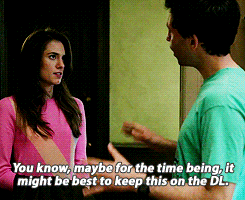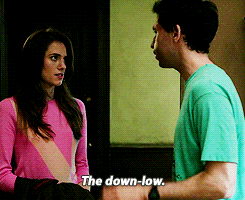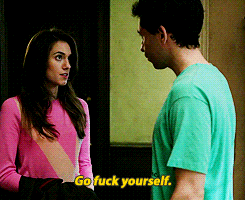This Week on Dear Television:
Pretty Girl Privilege
By Anne Helen Petersen
January 4, 2014
Dear Television,
CAN WE TALK about Marnie? We all know that Marnie’s the one you put on the lease. She’s super responsible: she’s the one who wakes up and blows out her hair every morning, who regularly buys vegetables, who always drinks a full 16 ounces of water after coming home from drinking and probably already uses anti-aging cream on her eyes.
Yet the criticisms of Marnie are myriad: she’s boring, she’s annoying, she’s vapid. She’s flatly beautiful and she has an inflated sense of self. And every single thing that Ray says about her in “Only Child” is absolutely true.
To wit:
“You’re extremely judgemental. You came in here and immediately insulted me and my neighborhood.”
“You come across like you’re better than everyone, and you want no part of their lives, and then when you’re excluded from things you’re outrageously offended and hold a grudge. Also you’re unbearably uptight.”
“And you use people. You use people a lot. So much so that even when you try to connect and be sincere, it comes across as phony. I think that more or less sums it up: you’re a huge, fat, fucking phony.”

Marnie’s not fat, but she’s definitely a phony. And when she tells Ray that “she could never live all the way out here” because “once you move to Manhattan, it’s kinda hard to move to Brooklyn,” she’s simply duplicating the speech that other phonies have used on her — what she’s been schooled in in terms of the rhetoric of success. You might not actually be doing awesome, but the key is that you talk like you’re doing awesome, which means that prestige will just naturally come your way. It’s a fallacy, but one that almost all television and art has both replicated and endorsed.
Girls, for all of its flaws, does speak truth to (most) power. Networking doesn’t work, and if it does, it’s morally repugnant; cultural capital gets you nowhere; standardized good looks get you a degrading job at a gentlemen’s club.
Which is why I like Marnie — or, more precisely, Girls’ horrible treatment of Marnie.
There are Marnies all over contemporary media, they just get everything that we’ve been conditioned to expect their looks, class, and education level meriting: outrageous success, perfect happiness. In Hollywood films, all these Marnies lack is a man — which they conveniently gain by the end of the three act structure. Katherine Heigl’s a Marnie; Jennifer Garner’s a Marnie; Jennifer Aniston is very often a Marnie. They’re not classy by birth (Marnies aren’t Gwyneths, after all: Jessa is a Gwenyth) but by try.
The implicit message of these Marnies? If you work hard — if you have great hair — you will get the things to which you are entitled. The job, the boy, the body, all yours, simply through the force of your American will. You don’t have to have charisma, per se, or even superlative, well, anything — you just have to be you and let things happen. Have a 15 year plan like Shoshana, only be less neurotic because no one has ever told you that you won’t get what you want in this life. You’re a pretty, skinny, moderately intelligent girl, and every piece of media you’ve consumed has told you that your life would go one way.
Only WAIT A SECOND, that’s all bullshit, because America is neither a meritocracy nor a prettitocracy: it’s all about connections, and no one in New York cares if you went to Oberlin and your mom has a solid upper middle class job as a real estate agent in New Jersey. Marnie spent so much of her life thinking that things would work out when she graduated that she forgot to actually become something. Hannah is insufferable in many ways, and certainly comes from a upper middle class background, but as someone who’s not traditionally “beautiful,” she’s always known that she has to distinguish herself in some way, whether through self-loathing humiliation (seemingly all of the stories in her memoir) or self-effacing branding (“I’m from the Midwest, so I’ll always be fifteen pounds overweight.”).
Even though everyone on Girls (save Ray) comes from some sort of privilege, the only privilege that actually buoys is the type enjoyed by Jessa and Adam: privilege that pays, usually in the form of a monthly allowance. Hannah survives and Shoshanna studies, but Jessa and Adam roam — when Adam criticizes his sister for having no real goals but lots of very strong opinions, he’s not only talking about himself, as Hannah immediately points out, but Jessa as well. Strong opinions, much like a room of one’s own a century ago, are the provenance of the uniquely privileged or the socially disenfranchised.
But Marnie doesn’t have strong opinions, or anything resembling character. She’s beige. She loves to sing covers. All because she got by for so long on being a pretty girl (and having a long-term boyfriend who constantly reinforced her conception of herself). Until the last year, no one ever said no to her — not her friends, not her boyfriend, not her professors, probably not her mom — which allowed her to age without growing. She’s the female version of the man-child, all pout-face and passive-aggressivity.
And in one of its most refreshing pieces of realism, Girls refuses to redeem her. Marnie had her fairy tale “I wanna have brown babies with you” interlude at the end of last season, but we knew it couldn’t last: no matter how low she’d been brought post break-up, she still believed that she deserved Charlie. . . . . that even with all his success, wrought not by looks but by ingenuity and tenacity, that he was lucky to have her.
When she wore the suspender lad-club outfit, we laughed. When she got shut in the avant garde art installment and thought it was amazing, we tittered. But that was all classic downward spiral post-grad shit, not entirely unlike Jessa’s marriage or Hannah’s relapse. Different modes and degrees, but all symptoms of the same malaise.
But now Hannah’s in a quasi-solid relationship (we’ll see what happens when she gets off the couch) and Jessa’s decided to get a job. Jessa will get what she wants — that’s what real privilege does. Marnie just goes on runs and makes kale shakes and adopts cats: she’s hit bottom; she knows she has to change, and the tragedy is that she thinks she is changing. She’s moved out of her mom’s, she got a job to pay the bills, but she still feels that “fancy people want to work with me,” which gives her the confidence to quit her job.
But in the unspecified amount of time between episode four and five, she’s realized something’s still wrong. Fancy people don’t want to work with her, even though they should. So she goes to Ray’s to have him tell her what’s wrong, but she doesn’t really want to know: just asking the question “what’s wrong with me” should be enough to merit change, or growth, or something that will make her fancy.
When Ray breaks down all the ways in which she’s leveraged her pretty-person confidence over others, she has a rebuttal at every turn: when he tells her that she insulted him and his neighborhood, she claims “those were funny jokes!” But as Ray counters, “were they, Marn? Were they funny jokes?” She sits the desk, hands folded in front of her, like a dutiful kindergartner, but she’s not actually listening. Marnie needs someone to boost her ego — to reaffirm what she’s always believed of herself — not puncture it, which Ray does with startling precision. He even traces her issues back to her father, a point she doesn’t bother to counter, because to speak it would be to acknowledge that she’s been hiding behind her face for years, even decades.
But for all of Ray’s honesty, he can’t resist the pitiful look in her eyes: he understands her, and recognizes her insecurity as a prettier form of his own, which allows Marnie to be “a sympathetic character.” We know that Ray loves books, and his love for Little Women suggests that he loves women — but usually as characters, not as real people, which is why the realness of Shoshana proved such a struggle. But you know what characters do in books? Fall into a manic, unanticipated, lustful embrace.
Marnie does it because she only feels desirable when someone’s desiring her; Ray does it because as much as he sees through her, he’s still subject to her. He recognizes the tell-tale signs of insecurity in Marnie, but the ability to perceive, even emphasize, doesn’t magically remove your own issues. After they finish, they’re both embarrassed: Marnie sees what she’ll do to salve her ego, and Ray sees how he’s now complicit in her problem.




The previews for next week suggest that Marnie and Ray start hanging out together, but I don’t think it’s a “transparent move to keep the ensemble together,” as a recent Flavorwire review argues. Marnie and Ray don’t make sense, but Marnie has no one else: Hannah’s obsessed with herself, her mom’s exhausted with her, and her kitten can’t talk back. She secretly wants to hear Ray say honest things about herself, especially if he’ll make her feel good immediately afterwards. He can be lacerating, but he’ll always have a band-aid.
Ray’s not handsome or suave or Charlie, and in his hilarious black basketball shorts, he’s the opposite of a fancy person. At this point, Marnie’s still fundamentally dishonest with herself — but hanging out with Ray might be the only way she could actually start growing instead of aging, doing instead of being.
Pretty people got no spine,
AHP
- "Pretty Girl Privilege," by Anne Helen Petersen
¤
Pretty Girl Privilege
By Anne Helen Petersen
January 4, 2014
Dear Television,
CAN WE TALK about Marnie? We all know that Marnie’s the one you put on the lease. She’s super responsible: she’s the one who wakes up and blows out her hair every morning, who regularly buys vegetables, who always drinks a full 16 ounces of water after coming home from drinking and probably already uses anti-aging cream on her eyes.
Yet the criticisms of Marnie are myriad: she’s boring, she’s annoying, she’s vapid. She’s flatly beautiful and she has an inflated sense of self. And every single thing that Ray says about her in “Only Child” is absolutely true.
To wit:
“You’re extremely judgemental. You came in here and immediately insulted me and my neighborhood.”
“You come across like you’re better than everyone, and you want no part of their lives, and then when you’re excluded from things you’re outrageously offended and hold a grudge. Also you’re unbearably uptight.”
“And you use people. You use people a lot. So much so that even when you try to connect and be sincere, it comes across as phony. I think that more or less sums it up: you’re a huge, fat, fucking phony.”

Marnie’s not fat, but she’s definitely a phony. And when she tells Ray that “she could never live all the way out here” because “once you move to Manhattan, it’s kinda hard to move to Brooklyn,” she’s simply duplicating the speech that other phonies have used on her — what she’s been schooled in in terms of the rhetoric of success. You might not actually be doing awesome, but the key is that you talk like you’re doing awesome, which means that prestige will just naturally come your way. It’s a fallacy, but one that almost all television and art has both replicated and endorsed.
Girls, for all of its flaws, does speak truth to (most) power. Networking doesn’t work, and if it does, it’s morally repugnant; cultural capital gets you nowhere; standardized good looks get you a degrading job at a gentlemen’s club.
Which is why I like Marnie — or, more precisely, Girls’ horrible treatment of Marnie.
There are Marnies all over contemporary media, they just get everything that we’ve been conditioned to expect their looks, class, and education level meriting: outrageous success, perfect happiness. In Hollywood films, all these Marnies lack is a man — which they conveniently gain by the end of the three act structure. Katherine Heigl’s a Marnie; Jennifer Garner’s a Marnie; Jennifer Aniston is very often a Marnie. They’re not classy by birth (Marnies aren’t Gwyneths, after all: Jessa is a Gwenyth) but by try.
The implicit message of these Marnies? If you work hard — if you have great hair — you will get the things to which you are entitled. The job, the boy, the body, all yours, simply through the force of your American will. You don’t have to have charisma, per se, or even superlative, well, anything — you just have to be you and let things happen. Have a 15 year plan like Shoshana, only be less neurotic because no one has ever told you that you won’t get what you want in this life. You’re a pretty, skinny, moderately intelligent girl, and every piece of media you’ve consumed has told you that your life would go one way.
Only WAIT A SECOND, that’s all bullshit, because America is neither a meritocracy nor a prettitocracy: it’s all about connections, and no one in New York cares if you went to Oberlin and your mom has a solid upper middle class job as a real estate agent in New Jersey. Marnie spent so much of her life thinking that things would work out when she graduated that she forgot to actually become something. Hannah is insufferable in many ways, and certainly comes from a upper middle class background, but as someone who’s not traditionally “beautiful,” she’s always known that she has to distinguish herself in some way, whether through self-loathing humiliation (seemingly all of the stories in her memoir) or self-effacing branding (“I’m from the Midwest, so I’ll always be fifteen pounds overweight.”).
Even though everyone on Girls (save Ray) comes from some sort of privilege, the only privilege that actually buoys is the type enjoyed by Jessa and Adam: privilege that pays, usually in the form of a monthly allowance. Hannah survives and Shoshanna studies, but Jessa and Adam roam — when Adam criticizes his sister for having no real goals but lots of very strong opinions, he’s not only talking about himself, as Hannah immediately points out, but Jessa as well. Strong opinions, much like a room of one’s own a century ago, are the provenance of the uniquely privileged or the socially disenfranchised.
But Marnie doesn’t have strong opinions, or anything resembling character. She’s beige. She loves to sing covers. All because she got by for so long on being a pretty girl (and having a long-term boyfriend who constantly reinforced her conception of herself). Until the last year, no one ever said no to her — not her friends, not her boyfriend, not her professors, probably not her mom — which allowed her to age without growing. She’s the female version of the man-child, all pout-face and passive-aggressivity.
And in one of its most refreshing pieces of realism, Girls refuses to redeem her. Marnie had her fairy tale “I wanna have brown babies with you” interlude at the end of last season, but we knew it couldn’t last: no matter how low she’d been brought post break-up, she still believed that she deserved Charlie. . . . . that even with all his success, wrought not by looks but by ingenuity and tenacity, that he was lucky to have her.
When she wore the suspender lad-club outfit, we laughed. When she got shut in the avant garde art installment and thought it was amazing, we tittered. But that was all classic downward spiral post-grad shit, not entirely unlike Jessa’s marriage or Hannah’s relapse. Different modes and degrees, but all symptoms of the same malaise.
But now Hannah’s in a quasi-solid relationship (we’ll see what happens when she gets off the couch) and Jessa’s decided to get a job. Jessa will get what she wants — that’s what real privilege does. Marnie just goes on runs and makes kale shakes and adopts cats: she’s hit bottom; she knows she has to change, and the tragedy is that she thinks she is changing. She’s moved out of her mom’s, she got a job to pay the bills, but she still feels that “fancy people want to work with me,” which gives her the confidence to quit her job.
But in the unspecified amount of time between episode four and five, she’s realized something’s still wrong. Fancy people don’t want to work with her, even though they should. So she goes to Ray’s to have him tell her what’s wrong, but she doesn’t really want to know: just asking the question “what’s wrong with me” should be enough to merit change, or growth, or something that will make her fancy.
When Ray breaks down all the ways in which she’s leveraged her pretty-person confidence over others, she has a rebuttal at every turn: when he tells her that she insulted him and his neighborhood, she claims “those were funny jokes!” But as Ray counters, “were they, Marn? Were they funny jokes?” She sits the desk, hands folded in front of her, like a dutiful kindergartner, but she’s not actually listening. Marnie needs someone to boost her ego — to reaffirm what she’s always believed of herself — not puncture it, which Ray does with startling precision. He even traces her issues back to her father, a point she doesn’t bother to counter, because to speak it would be to acknowledge that she’s been hiding behind her face for years, even decades.
But for all of Ray’s honesty, he can’t resist the pitiful look in her eyes: he understands her, and recognizes her insecurity as a prettier form of his own, which allows Marnie to be “a sympathetic character.” We know that Ray loves books, and his love for Little Women suggests that he loves women — but usually as characters, not as real people, which is why the realness of Shoshana proved such a struggle. But you know what characters do in books? Fall into a manic, unanticipated, lustful embrace.
Marnie does it because she only feels desirable when someone’s desiring her; Ray does it because as much as he sees through her, he’s still subject to her. He recognizes the tell-tale signs of insecurity in Marnie, but the ability to perceive, even emphasize, doesn’t magically remove your own issues. After they finish, they’re both embarrassed: Marnie sees what she’ll do to salve her ego, and Ray sees how he’s now complicit in her problem.




The previews for next week suggest that Marnie and Ray start hanging out together, but I don’t think it’s a “transparent move to keep the ensemble together,” as a recent Flavorwire review argues. Marnie and Ray don’t make sense, but Marnie has no one else: Hannah’s obsessed with herself, her mom’s exhausted with her, and her kitten can’t talk back. She secretly wants to hear Ray say honest things about herself, especially if he’ll make her feel good immediately afterwards. He can be lacerating, but he’ll always have a band-aid.
Ray’s not handsome or suave or Charlie, and in his hilarious black basketball shorts, he’s the opposite of a fancy person. At this point, Marnie’s still fundamentally dishonest with herself — but hanging out with Ray might be the only way she could actually start growing instead of aging, doing instead of being.
Pretty people got no spine,
AHP
¤
LARB Contributor
Anne Helen Petersen is a Ph.D. from the University of Texas – Austin in the Department of Radio-Television-Film. She currently teaches film and media studies at Whitman College.
LARB Staff Recommendations
True Detective, Season 1: "Seeing Things"
The foreign object at the center of HBO's True Detective
Girls, Season 3: "She Said OK"
This week on Dear Television: "Sticking to Snacks," from Jane Hu "The Other Shoe," from Lili Loofbourow ¤ Sticking to SnacksBy Jane HuJanuary 23...
Did you know LARB is a reader-supported nonprofit?
LARB publishes daily without a paywall as part of our mission to make rigorous, incisive, and engaging writing on every aspect of literature, culture, and the arts freely accessible to the public. Help us continue this work with your tax-deductible donation today!
:quality(75)/https%3A%2F%2Fdev.lareviewofbooks.org%2Fwp-content%2Fuploads%2F2014%2F02%2FGirls-logo.svg_.png)